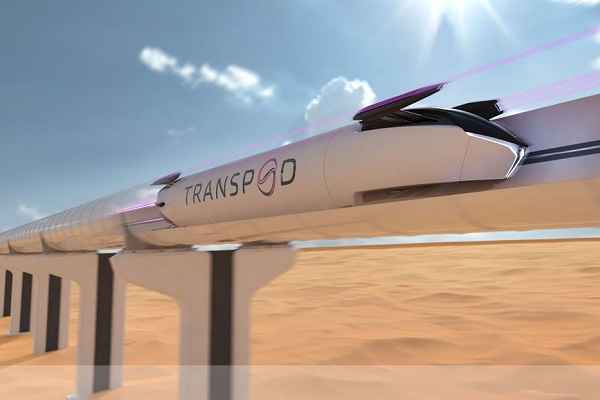 Exclusive Interview of Ms. Serda Urganciyan, Partner-CEO at Studio 88 Architecture
Exclusive Interview of Ms. Serda Urganciyan, Partner-CEO at Studio 88 Architecture Titagarh Rail Systems set to deliver first sleeper Vande Bharat Train by late 2025
Titagarh Rail Systems set to deliver first sleeper Vande Bharat Train by late 2025 UAE's First Vertiport gets Operational approval, A game-changer in Autonomous Transportation
UAE's First Vertiport gets Operational approval, A game-changer in Autonomous Transportation Nafisah Aslam-Zainudeen: Inspiring the Next Generation of Female Engineers
Nafisah Aslam-Zainudeen: Inspiring the Next Generation of Female Engineers DRA-DMRC JV awarded major contract for redevelopment of Ahmedabad Railway Station
DRA-DMRC JV awarded major contract for redevelopment of Ahmedabad Railway Station Revolutionizing Transportation: Hyperloop Technology in Saudi Arabia
Revolutionizing Transportation: Hyperloop Technology in Saudi Arabia India is not just a market, it is becoming a beacon of hope for the future: Siemens AG
India is not just a market, it is becoming a beacon of hope for the future: Siemens AGSATEBA acquires Rail Business of De Bonte Group in Belgium
 Regent to launch High-Speed Seagliders to transform coastal transportation in UAE
Regent to launch High-Speed Seagliders to transform coastal transportation in UAE California commences construction on $12bn Los Angeles - Vegas High Speed Rail Project
California commences construction on $12bn Los Angeles - Vegas High Speed Rail Project
What are the Pro and Cons of autonomous vehicles?

Autonomous vehicles, also known as self-driving cars or driverless cars, have the potential to revolutionize transportation. While they offer several potential benefits, they also come with various challenges and concerns. Let's delve into an in-depth analysis of the pros and cons of autonomous vehicles:
Pros of Autonomous Vehicles
Enhanced Safety: One of the primary promises of autonomous vehicles is improved safety on the roads. Human error is a leading cause of accidents, and autonomous vehicles have the potential to minimize or eliminate human-related factors, such as distracted driving, fatigue, and impaired driving. They can employ advanced sensors, artificial intelligence, and real-time data analysis to make safer driving decisions.
Reduced Accidents and Fatalities: By eliminating human error and improving overall road safety, autonomous vehicles have the potential to significantly reduce accidents and fatalities. According to estimates, over 90% of road accidents are caused by human error, and autonomous vehicles could help save thousands of lives each year.
Increased Mobility and Accessibility: Autonomous vehicles have the potential to improve mobility for individuals who are unable to drive, such as the elderly, disabled, or visually impaired. They can provide newfound independence and accessibility, allowing these individuals to travel independently and participate more fully in society.
Traffic Efficiency and Reduced Congestion: Autonomous vehicles can communicate and coordinate with each other, leading to improved traffic flow and reduced congestion. They can optimize speed, spacing, and merging, leading to more efficient use of road space and fewer traffic jams. This can result in time savings, reduced fuel consumption, and less overall traffic-related stress.
Environmental Benefits: Autonomous vehicles can be more fuel-efficient and eco-friendly compared to traditional vehicles. They can optimize routes, accelerate and decelerate more efficiently, and reduce unnecessary idling. Additionally, the rise of electric autonomous vehicles can further reduce carbon emissions and dependence on fossil fuels.
Productivity and Time Savings: With autonomous vehicles, occupants can reclaim the time spent on driving. Commuters can engage in work, leisure activities, or relaxation during their journeys, leading to increased productivity and better work-life balance.
Improved Traffic Management and Infrastructure: Autonomous vehicles generate a wealth of real-time data about road conditions, traffic patterns, and infrastructure requirements. This information can be used to improve traffic management, optimize road infrastructure planning, and enhance transportation systems overall.
Cons of Autonomous Vehicles
Technological Challenges: Developing and implementing fully autonomous vehicles on a large scale involves significant technological challenges. Ensuring the reliability and safety of the complex systems required for autonomous driving is a complex task. Issues such as sensor accuracy, software vulnerabilities, and decision-making algorithms need to be carefully addressed to minimize risks.
High Initial Costs: The development, manufacturing, and deployment of autonomous vehicles involve significant investments. The advanced sensors, computing systems, and infrastructure required for autonomous driving can be costly, which may initially limit the accessibility and affordability of autonomous vehicles.
Legal and Regulatory Framework: The legal and regulatory framework for autonomous vehicles is still evolving. Determining liability in accidents involving autonomous vehicles, addressing privacy concerns related to data collection, and establishing consistent regulations across different jurisdictions are complex challenges that need to be addressed.
Ethical Considerations: Autonomous vehicles face ethical dilemmas when it comes to decision-making in potentially dangerous situations. For example, determining how a vehicle should prioritize the safety of its occupants versus that of pedestrians or other drivers raises difficult ethical questions that need careful consideration.
Job Displacement: The widespread adoption of autonomous vehicles could lead to job displacement in various sectors, such as transportation, delivery services, and taxi industries. Workers in these fields may need to acquire new skills or transition to other industries, potentially leading to social and economic disruptions.
Cybersecurity Risks: Autonomous vehicles rely on complex software systems and connectivity, which makes them vulnerable to cyberattacks. Hacking or malicious interference could compromise the safety and privacy of occupants and the overall functioning of autonomous vehicles.
Public Trust and Acceptance: Building public trust and acceptance of autonomous vehicles is crucial for their successful adoption. Concerns about safety, privacy, and a lack of familiarity with autonomous technology may hinder widespread acceptance and delay the integration of autonomous vehicles into society.
As with any emerging technology, autonomous vehicles present both opportunities and challenges. Ongoing research, development, and collaboration between stakeholders, including governments, manufacturers, and technology companies, are essential to address these challenges and maximize the potential benefits of autonomous vehicles.







